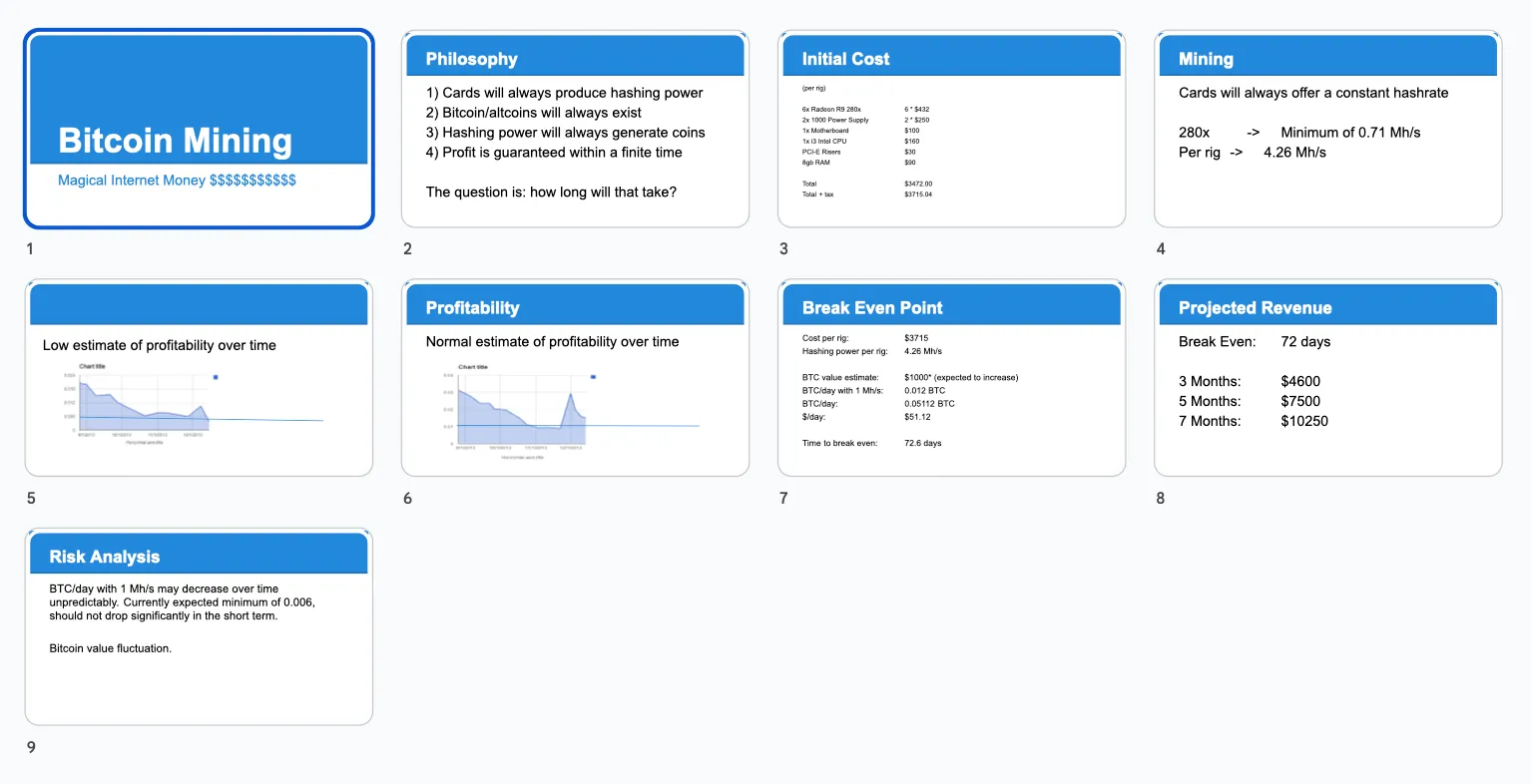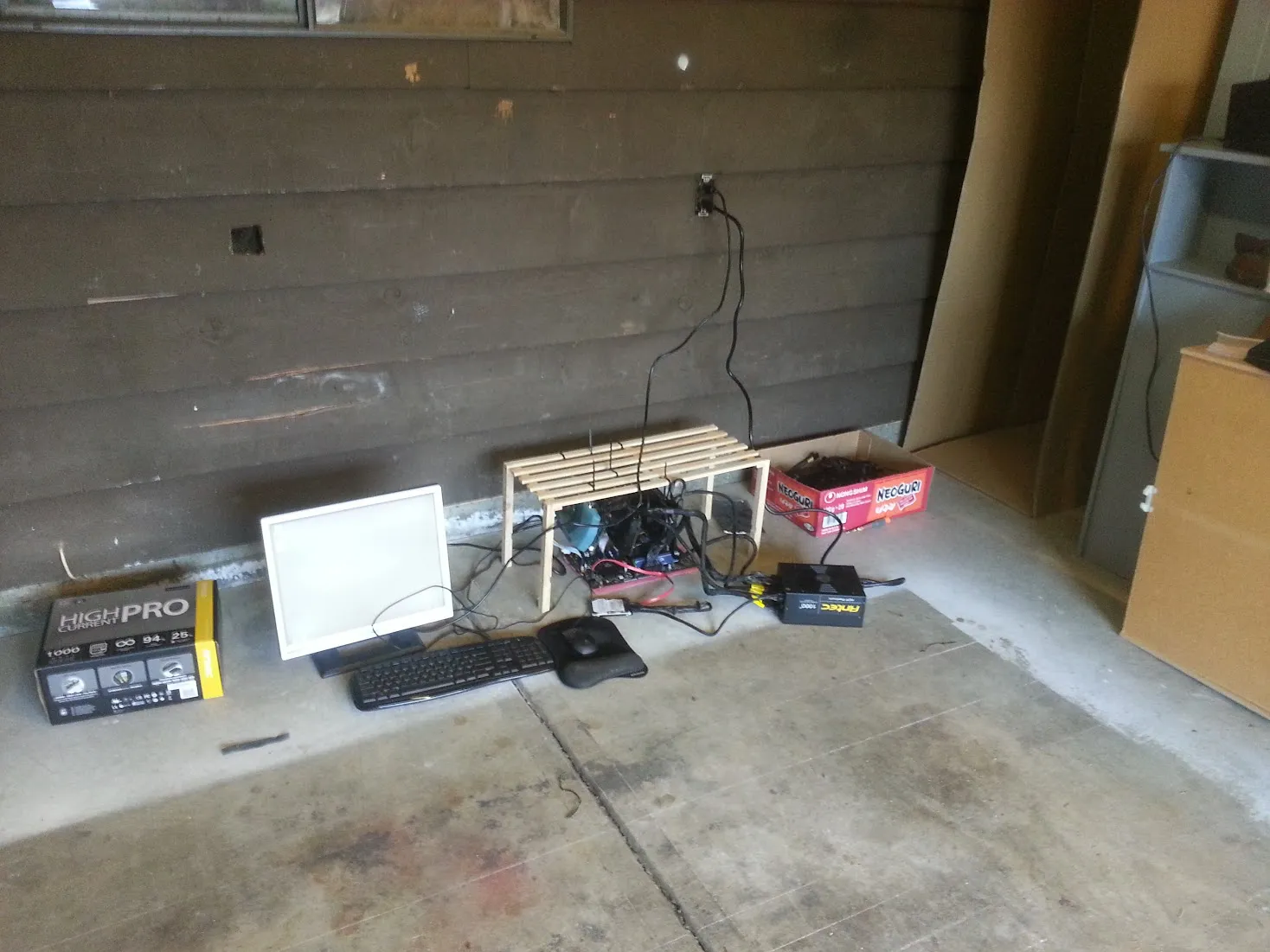Why Bitcoin?
Origins
In the winter of 2013, I grouped up with a few of my friends with a scheme to make magic internet money. I even put together “business slides” to get everyone in on it.

We each invested hundreds of dollars, purchased as many GPUs and computer parts as we could, then set up mini-PCs using flimsy wooden shoe racks to mine Bitcoin. At the time ASICs were taking off, so GPUs were mostly only effective at mining altcoins. We settled on using an algorithmic altcoin mining pool that mined the most profitable altcoin at any given moment, bought Bitcoin with the proceeds, and distributed them back to the miners. We set up the machines at my friend’s parent’s home in a cold garage.
Here is what one of our rigs looked like:

But it wasn’t enough. I figured that I could beat the market. It couldn’t be that hard, right? If I sell my Bitcoin when prices are high, and buy when it’s low, I make money. Unfortunately over the next several months, I would stay up late, eyes stinging, watching charts, and wondering why the funny technical lines I drew (according to the other crypto traders on YouTube) did not result in profits. No, I couldn’t be wrong… the market had to be wrong.
I ended up losing most of my personal holdings. Mt Gox going bust in 2014 did not help either, and I watched the value of 1 Bitcoin dwindle away from its peak of over $1100 USD to lows that I thought were unfathomable. Eventually we all just lost interest in the coin, sold off what we could, divided up what was left, and called it a day.
I would sit out the next 2 cycles, salty about what had happened. $19,000 USD BTC in 2017? Just a stupid tulip bubble, it will pop like it did for me. $60,000 USD BTC? Just a stupid bubble…
They say that everyone buys Bitcoin at the price they deserve. I think there is great truth to that. After participating in 1 cycle, losing it all, and sitting out 2 more, I decided to sit down and truly figure out what my values were, and how they related to Bitcoin.
The purpose of this blog isn’t to explain what Bitcoin is (there are tons of resources online for that). Rather, it’s to share my personal journey and thoughts.
De-monetizing real estate
I believe that one of the most harmful forms of price increases is rising house prices and rents, which especially harms the most vulnerable populations who just need safe places to stay at.
Across the world, excess money flows into real estate because it is a scarce asset that can protect purchasing power better than most other assets. Whatever the % of global funds are, it has fluctuated throughout history, competing with things like gold, and in modern history, equities. It necessarily drives prices up in ways that local populations of cities cannot anticipate. In Metro Vancouver where I live, we only have a population of around 2.6 million, with the City of Vancouver itself having less than 1 million people. We are a young, emerging city, so when a larger economic entity anywhere on the planet sneezes, that flow of funds can disproportionately affect local housing prices.
And cities can’t really do anything to stop them. Money always finds a way, regardless of whatever regulations local governments try to implement. It’s helpful to see money as water, always flowing towards what it thinks the best asset is, seeping through even the smallest cracks in walls others may put up and eventually eroding it. In the long run, it’s hard to stop.
During my childhood, we lived in a household with an extremely violent father. I wanted nothing more than my mother’s safety, but on a minimum wage income, even back in the day before the latest real estate boom, it was not easy to just find a place to live in and be safe. If we think broader about all others in dangerous situations, hopefully it’s easy to understand why I think it should not be difficult to find a safe place to live. And if we go further out, we can think about students who want to live away from home, immigrants who are trying to plant their first roots, young professionals moving into the city looking for opportunities, and more.
Some would argue that nobody is entitled to a home. Sure, but what I’m asking for is not a lot. Most houses are large luxuries, but I imagine a world where there is a supply of small studios or 1 bedroom units that can be afforded by those who need them at prices that don’t break the bank. This does not have to come at the cost of those who seek nice large single family homes.
The problem is that as long as real estate has what’s called a “monetary premium” (extra money flowing into it), local prices will always be influenced by massive pools of global capital that does what it wants. I realized that the only way this will change is if there is another asset that absorbs this monetary premium. Absorbing the premium would be difficult, but it would bring the price of real estate closer to its utility value. Homes in city centers will remain expensive, but less expensive relatively to before.
If this asset does not exist, then there might be no hope of ever reaching utility value real estate. Humans will spend the rest of time fighting over homes as opposed to freeing ourselves up from that struggle and moving onto bigger things. I just refuse to believe that we’re still doing this centuries from now and not moving onto bigger problems.
Keeping governments honest
There is a deal governments make with their citizens. Governments provide citizens with certain things (usually private property rights, defense, services) in exchange for taxes. The terms of this deal may fluctuate based on the political flavor of the time, but that’s to be expected. Citizens can express their wants via elections.
But something happens when governments can bypass this mechanism. What if you could produce funds without asking your citizens? Interesting… now you can spend money on things you know the population would not necessarily support. Possibly things like wars.
I believe that’s what expanding the monetary supply (“money printing”) and monetary inflation does. Through consistent monetary inflation, it allows governments to spend more than they have, with the knowledge that their liabilities shrink (in real terms) over time. And that extra money is rarely spent on great long-term things because there is no accountability. We can just continue to do it, over and over.
From the little I understand about history, this has been a consistent problem for almost every civilization that existed. Governments have every incentive to find ways to spend more than they have, it’s just natural. But, the way we end this cycle is by having a monetary entity that exists outside of governments that keeps their currencies honest.
Of course, that asset could be gold, but it has been gamed many many times. You just don’t know how much gold exists where. Gold can be hidden. Rehypothecated. Converted into complex financial instruments that make it difficult to trace. Diluted with various other metals that make its true value difficult to assess. These shortcomings cannot be overcome. I used to be a gold bug, but I understand that the time of gold for this purpose is probably over. We’ll need something else that can fulfill this role.
Michael Saylor emphasizes that the best asset in the world must necessarily have these properties:
- Scarcity
- Durability
- Divisibility
- Portability
- Verifiability
- Security
- Recognizability
- Censorship resistance
I’m open to changing my mind about what asset takes gold’s place and meets these criteria. So far, I only see one. And by nature, if it acts as the global financial honesty-keeper, it will not be adopted by governments willingly. Only reluctantly, either after large crises or when other countries start getting a competitive edge by adopting Bitcoin that cannot be ignored (game theory).
AGI’s store of value
I think there is value in understanding how large future economic entities may conduct business, and aligning ourselves towards that. 2025 is a futuristic year, so let’s be a bit more speculative.
When AGI appears (and I believe when it does, we’ll have multiple competing at the same time), they will be economic players in the global market. They will bargain. They will trade. They will store economic power in order to use it at will. And when they do, we have to ask what they might store their economic power in.
Non-humans cannot open bank accounts. And if you’re greater than a human, does it make sense to store your lifeblood in something like the USD? You may or may not have physical capabilities, so you wonder if gold is really the best way to store energy. And would you store in some cryptocurrency whose monetary mechanics are primarily influenced by central human organizations?
I’m making stuff up at this point, but I believe that a large intelligent system would:
- Store long-term finances in Bitcoin
- Store medium-term finances in whatever the future version of equity markets are based on its political beliefs
- Store working finances in whatever asset/currency is needed at the time (ex. buying things, selling things, trading with other AGI, paying humans)
- Store any physical assets with whatever its physical capabilities are at the time
It just makes sense to me, but I’d love to learn what others think.
Final thoughts
As I write this, I realize that I probably have a lot more to say about Bitcoin than I initially anticipated. It’s one of the most fascinating technology/finance stories to watch this century, and I’m honored to be able to participate and see it happen.